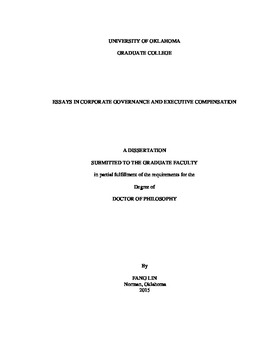| dc.contributor.advisor | Stanhouse, Bryan | |
| dc.contributor.author | Lin, Fang | |
| dc.date.accessioned | 2015-05-01T15:31:12Z | |
| dc.date.available | 2015-05-01T15:31:12Z | |
| dc.date.issued | 2015-05 | |
| dc.identifier.uri | https://hdl.handle.net/11244/14552 | |
| dc.description.abstract | This dissertation is a collection of three essays that investigate the issues related to corporate governance and executive compensation. In Chapter 1 I employ a sample of U.S. public firms to investigate the effect of executive compensation, especially short-term incentives, upon corporate innovation strategies. I show that CEOs with longer “pay duration” and CEOs receiving a higher “executive vega” direct their firms into more exploratory, as opposed to exploitative, innovations. The results obtained from an instrumental variable estimation establish my conclusions. Chapter 2 examines the expected time to merger for a Special Purpose Acquisition Corporation (SPAC). A SPAC is a company created for the sole purpose of merging with a private firm looking to become publicly traded. A simple target acquisition model is employed in empirical investigation of the determinants of the time to a successful merger between a SPAC and a private firm. We consider seven sources of independent variables including SPAC managerial characteristics, investor characteristics, underwriter characteristics, macroeconomic conditions, financial conditions, the “first mover” phenomenon, and the SPAC characteristics. Survival analysis establishes that these sources yield over twenty right hand side variables as being statistically significant in determining the time to merger. Chapter 3 investigates the influence of the media upon executive compensation. Specifically, we study how incoming CEOs’ media exposure influences the changes in compensation relative to their predecessors’ during turnover events. While having a media exposure does not influence total compensation of a CEO, it affects the composition of the compensation package. Specifically, the proportion of stocks and options relative to the total pay are significantly higher among incoming CEOs with higher media exposures. Moreover, the compensation packages provide high delta to more visible CEOs. Our results suggest that the media acts as a “watchdog” which provides external monitoring power in setting CEO pays. | en_US |
| dc.language | en_US | en_US |
| dc.subject | Economics, Finance. | en_US |
| dc.subject | Business Administration, Management. | en_US |
| dc.subject | Business Administration, General. | en_US |
| dc.title | Essays in Corporate Governance and Executive Compensation | en_US |
| dc.contributor.committeeMember | Dauffenbach, Robert | |
| dc.contributor.committeeMember | Fernando, Chitru | |
| dc.contributor.committeeMember | Linn, Scott | |
| dc.contributor.committeeMember | Mahmudi, Hamed | |
| dc.contributor.committeeMember | Stock, Duane | |
| dc.date.manuscript | 2015 | |
| dc.thesis.degree | Ph.D. | en_US |
| ou.group | Michael F. Price College of Business | en_US |
| shareok.nativefileaccess | restricted | en_US |
